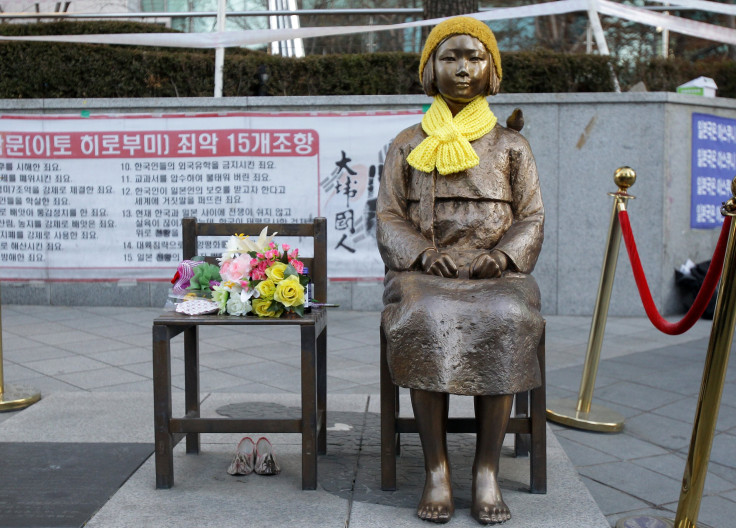Who Are The ‘Comfort Women’? Why Japan And South Korea Are Fighting Over Sex Slaves

Japan withdrew its ambassador to South Korea Friday over a statue symbolizing “Comfort women” was placed outside the Japanese embassy in Busan. The incident is just the latest in the decades-long dispute over Japan’s use of South Korean sex slaves in wartime Japanese military brothels.
The 5-foot-tall bronze statue depicting a “comfort woman,” the euphemism long used to describe the women forced to work in the brothels, was first put up last week outside the embassy in the southern port city of Busan. As a result, Japan’s government announced Friday that it was withdrawing not only its ambassador to South Korea, Yasumasa Nagamine, but also its Busan consul-general. Japan also halted ongoing negotiations over a currency-swap agreement between the two countries.
“The Japanese government finds this situation extremely regrettable,” Japan’s chief government spokesman Yoshihide Suga said at a media conference announcing its measures. “The Japanese government will continue to strongly urge the South Korean government as well as municipalities concerned to quickly remove the statue of the girl.”
The statue, a copy of one that resides outside the Japanese embassy in Seoul, was initially removed by local authorities when it was placed outside the Busan embassy last week. But it was allowed to be returned after a massive public outcry that overwhelmed the local district office, reported The Korea Herald.
Just two days later, the mayor apologized for its removal. Protesters were also angered by a visit of Japan’s defense minister to a controversial war shrine to Japan’s war dead just a day after the statue’s initial removal.
Japan has claimed that the statue violates a deal signed in 2015 that saw Japan formally apologize and agree to pay one billion yen ($8.6 million) to victims. Critics, however, argue that the deal does not go nearly far enough to provide direct compensation for the women. Of the estimated 200,000 women forced to work in brothels, most were Korean, with others coming from China, Indonesia, the Philippines and Taiwan. There are believed to be 46 surviving victims in South Korea.
Also on Friday, a South Korean court ordered the Seoul government to disclose part of its files related to its negotiations with Japan on the 2015 deal, according to South Korea’s Yonhap News agency.
Meanwhile, South Korea’s foreign ministry criticized the decision of Japan to withdraw its ambassador over the statue, which depicts a young woman sitting barefoot in a chair.
"We express our strong regret over the action taken by Japan with regard to the statue,” a foreign ministry spokesman said. "The government wants to make it clear again that both countries should keep advancing their bilateral ties based on trust regardless of any challenging issues.”
© Copyright IBTimes 2024. All rights reserved.





















